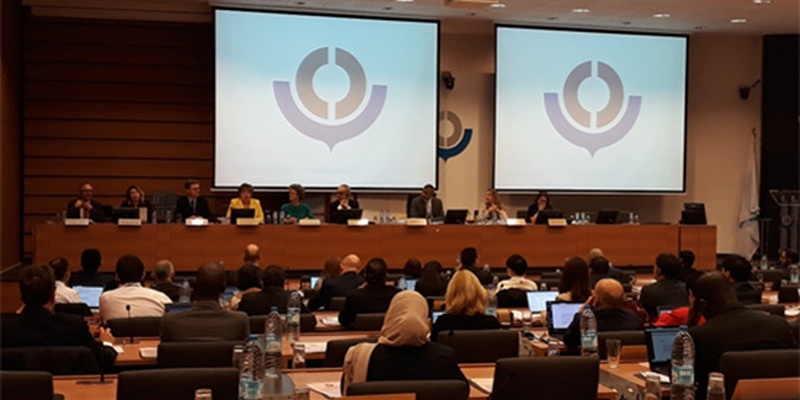Coordinated Border Management – a hot topic at the World Customs Organization meeting
Posted on Thu, 21 Nov 2019, 12:34

The IPPC Secretariat participated in the Coordinated Border Management (CBM) panel discussion. © FAO
28 October 2019, Brussels - The IPPC Secretariat participated in the Coordinated Border Management (CBM) panel discussion during the meeting of the Permanent Technical Committee (PTC) of the World Customs Organization (WCO) in Brussels, Belgium. Indeed the ever-increasing volume of goods and people crossing borders brings up the dilemma of how to facilitate trade and transport while mitigating phytosanitary risks and other types of threats. CBM is an important part of the answer to this dilemma.
The panel was composed of representatives from the Codex Alimentarius Commission, the International Maritime Organization, the International Organization for Migration, the Office International des Epizooties (OiE) as well as the IPPC Secretariat.
Ms Sarah Brunel, Implementation Officer with the IPPC Secretariat, presented the mission of the IPPC Community as outline in the IPPC Strategic Framework (2020-2030). She updated the audience about the IPPC Secretariat’s collaboration with the WCO for themes related to border management - in particular joint activities to help manage the risks of cross border e-commerce, electronic data exchange (e-Phytos) and sea containers. She explained that just as the OIE conducts Performance of Veterinary Services (PVS) evaluations, the IPPC Secretariat implements Phytosanitary Capacity Evaluations (PCE) to identify weaknesses and strengths in national phytosanitary systems.
She highlighted the need for raising awareness and building capacity to help increase the collaboration at the national level between plant protection organizations (NPPOs) and customs organizations.
Several questions were raised in the panel discussion such as how to deal with low risk commodities, the rights of a country to take its own phytosanitary measures and why services at the border take different times to perform for different types of consignments. Ms Brunel provided references to the relevant ISPMs, in particular ISPM 11 on Pest Risk Analysis and invited delegates to liaise with National Plant Protection organizations in their countries.
The Permanent Technical Committee acknowledged challenges and areas for further exploration including promoting risk management, using electronic documentation, and strengthening interagency collaboration. Delegates appreciated having a global overview of the various relevant institutions’ activities on border control.
Ms Brunel also delivered a presentation on the International Year of Plant Health (IYPH) where she informed the audience about how the year will be promoted in 2020 and encouraged them to do the same.

